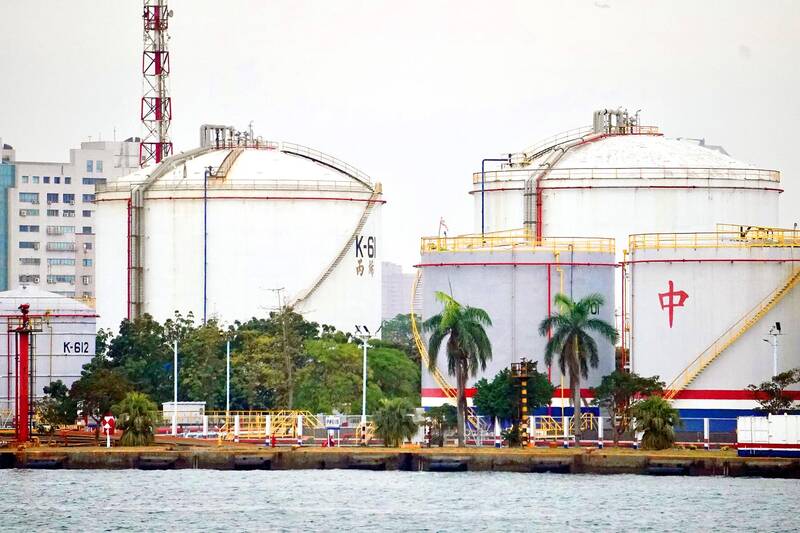The Chinese government’s announcement that it is to suspend tariff relief on imports of 12 Taiwanese petrochemical products from Jan. 1 is “regrettable,” the Ministry of Economic Affairs said in a statement yesterday.
The move is the latest example of Beijing “politicizing trade,” this time in the run-up to the presidential and legislative elections on Jan. 13, the ministry said.
Taiwan continues to urge that any trade disputes be handled through the WTO, of which both sides are members, it said.

Photo: CNA
The comments came after the Chinese Customs Tariff Commission announced sanctions on 12 petrochemical products, including propylene and paraxylene, which have reduced tariffs under the Economic Cooperation Framework Agreement (ECFA) that the two sides signed in 2010.
The measures come in response to “unilateral, discriminatory trade restrictions” by Taiwan on imports of Chinese products, contravening ECFA provisions, the commission said, referring to the results of a probe that Beijing announced last week.
Office of Trade Negotiations Deputy Trade Representative Jenni Yang (楊珍妮) described the commission’s decision yesterday as “classic economic coercion” and out of step with international norms.
However, National Development Council Minister Kung Ming-hsin (龔明鑫) said that the move would not harm Taiwan’s economic outlook, as overall ECFA exports only account for about 4 percent of the nation’s total and only 12 items are affected.
“We will not change next year’s economic growth [forecast] because of this. It will still exceed 3 percent,” Kung told reporters after a regular Cabinet meeting.
The Mainland Affairs Council separately condemned Beijing’s “election interference,” saying its actions harm others at no benefit to itself.
Zhu Fenglian (朱鳳蓮), spokeswoman for China’s Taiwan Affairs Office, cast blame for the decision on trade restrictions enacted by the Democratic Progressive Party government.
Beijing is hopeful that cross-strait relations can “return to the right track of peaceful development,” Zhu said, adding that negotiations to resolve trade disputes could begin “immediately” on the basis of the so-called “1992 consensus.”
The “1992 consensus” refers to a tacit understanding between the Chinese Nationalist Party (KMT) and the Chinese Communist Party that both sides of the Taiwan Strait acknowledge that there is “one China,” with each side having its own interpretation of what “China” means.
The Petrochemical Industry Association of Taiwan said that because much of the petroleum sector consists of joint products — those generated in a single production process — the effects of the reinstated tariffs are likely to be felt up and down supply chains.
The Taipei-based Chinese National Federation of Industries said that the government should set up channels to communicate with China on the issue, while also expediting efforts to help local companies diversify into other international markets.
Ministry data showed that about US$1.8 billion of the 12 products were exported to China in the first 11 months of this year, or about 1.3 percent of Taiwan’s total exports to China.
The vast majority of those products — about US$1.6 billion — would now be subject to an import tax of 1 to 2 percent, it said.
Through last month, China accounted for about 35 percent of Taiwan’s total annual exports, down from 40 percent in previous years, it added.

DAREDEVIL: Honnold said it had always been a dream of his to climb Taipei 101, while a Netflix producer said the skyscraper was ‘a real icon of this country’ US climber Alex Honnold yesterday took on Taiwan’s tallest building, becoming the first person to scale Taipei 101 without a rope, harness or safety net. Hundreds of spectators gathered at the base of the 101-story skyscraper to watch Honnold, 40, embark on his daredevil feat, which was also broadcast live on Netflix. Dressed in a red T-shirt and yellow custom-made climbing shoes, Honnold swiftly moved up the southeast face of the glass and steel building. At one point, he stepped onto a platform midway up to wave down at fans and onlookers who were taking photos. People watching from inside

A Vietnamese migrant worker yesterday won NT$12 million (US$379,627) on a Lunar New Year scratch card in Kaohsiung as part of Taiwan Lottery Co’s (台灣彩券) “NT$12 Million Grand Fortune” (1200萬大吉利) game. The man was the first top-prize winner of the new game launched on Jan. 6 to mark the Lunar New Year. Three Vietnamese migrant workers visited a Taiwan Lottery shop on Xinyue Street in Kaohsiung’s Gangshan District (崗山), a store representative said. The player bought multiple tickets and, after winning nothing, held the final lottery ticket in one hand and rubbed the store’s statue of the Maitreya Buddha’s belly with the other,

‘COMMITTED TO DETERRENCE’: Washington would stand by its allies, but it can only help as much as countries help themselves, Raymond Greene said The US is committed to deterrence in the first island chain, but it should not bear the burden alone, as “freedom is not free,” American Institute in Taiwan Director Raymond Greene said in a speech at the Institute for National Defense and Security Research’s “Strengthening Resilience: Defense as the Engine of Development” seminar in Taipei yesterday. In the speech, titled “Investing Together and a Secure and Prosperous Future,” Greene highlighted the contributions of US President Donald Trump’s administration to Taiwan’s defense efforts, including the establishment of supply chains for drones and autonomous systems, offers of security assistance and the expansion of

Japan’s strategic alliance with the US would collapse if Tokyo were to turn away from a conflict in Taiwan, Japanese Prime Minister Sanae Takaichi said yesterday, but distanced herself from previous comments that suggested a possible military response in such an event. Takaichi expressed her latest views on a nationally broadcast TV program late on Monday, where an opposition party leader criticized her for igniting tensions with China with the earlier remarks. Ties between Japan and China have sunk to the worst level in years after Takaichi said in November that a hypothetical Chinese attack on Taiwan could bring about a Japanese